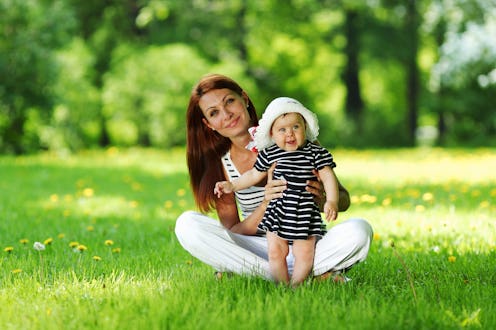Life
Is There A Big Benefit to Having Babies Later?

Did you see the recent news that "women who have babies after 33 live longer?" Media outlets, including Forbes, were quick to spread this apparently excellent discovery for us late reproductive bloomers. But hold the phone: the study referenced is pretty deeply limited. If you're not ready for kids, don't have them yet — but don't delay for longevity's sake.
The relevant research was conducted by a team whose findings will be published next year in the medical journal Menopause. From the abstract of the forthcoming article, "Extended maternal age at birth of last child and women's longevity in the Long Life Family Study:"
We found a significant association for older maternal age, whereby women who had their last child beyond age 33 years had twice the odds for survival to the top 5th percentile of survival for their birth cohorts compared with women who had their last child by age 29 years
Put simply, within this sample set, if you had a baby after age 33 then you're twice as likely to live past 95 than someone whose last baby was born by age 29. Cool, right? Unfortunately, the "within this sample set" caveat matters greatly. As the article's title suggests ("Long Life Family Study"), all of this maternal longevity study data was taken from a set of statistics about families that were unusually healthy and long-lived. We have no clue what kind of genetic differences make this group systemically dissimilar from the rest of us, and how they might affect reproductive issues.
It may be the case that all mothers benefit from having a baby past 33 years old, but we certainly can't just generalize from the study at hand. Also, the researchers don't propose an explanation for why mothers who had their last child later seem to live longer. Maybe the causation is the other way around: if a woman is healthier to begin with, she may continue having children longer into her fertile years. Whereas women who have health conditions may decide not to continue having children into their 30s. Or, perhaps they choose not to space their children as widely apart for fear pregnancy will only get more difficult for them later in life (meaning they finish breeding sooner).
So basically there's no particular reason for you, as a woman from a family of undetermined longevity, to base your own child-bearing decisions on this theoretical correlation between ages of some mothers at last birth and those particular mothers' ages at death. But having more babies, even if that means having them later, seems to be in fashion. The fertility dropoff a woman experiences post-20s has apparently been quite exaggerated, and there are plenty of even "selfish" reasons to have more kids. So you can feel OK having kids into your 30s, whether it lengthens your life or not.
Image: yellowj / Fotolia.com